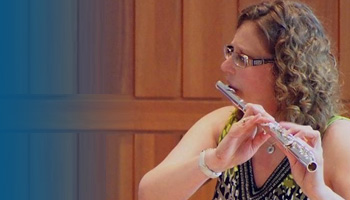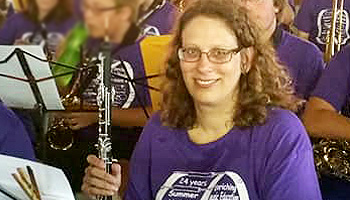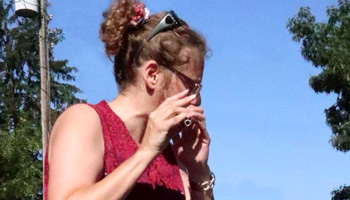HOW CAN WE HELP YOU? Call 1-800-TRY-CHOP
In This Section
Music, Marching, Making Memories With Laura Schultz, PhD
 Laura Schultz, PhD, playing the flute in a Beethoven trio.
Laura Schultz, PhD, playing the flute in a Beethoven trio.limjr [at] chop.edu (By Jillian Rose Lim)
Editor's Note: Hello, summer! And welcome back to our seasonal Off Campus series where we share the off campus exploits and adventures of our Research Institute colleagues. Read along to learn what your co-workers do to de-stress and reset once they leave Osler Circle or close the door to their home offices.
For data scientist Laura Schultz, PhD, music, and marching are a family affair. On any given week prior to the pandemic, you’d likely find Dr. Schultz and her two daughters rehearsing or parading as members of the Original Hobo Band, a Pitman New Jersey community of passionate musicians. Dressed in the band’s “hobo rags” (traditional mismatched uniforms harking back to the band’s earliest days), you might see Dr. Schultz playing the oboe, the flute, or the piccolo — and sometimes, all three in the same concert.
Rags and rehearsals might seem a world away from her work at CHOP’s Department of Biomedical and Health Informatics (DBHi), but playing music is a way to de-stress for Dr. Schultz, even throughout the pandemic. She began playing virtual performances with the Penn Med Symphony Orchestra in July 2020 and continues to piece together virtual performances from individual recordings with the Hobo Band.
“Music has always been a source of joy for me, and I have been thrilled to share that joy with both of my daughters,” Dr. Schultz said. “When I am feeling stressed, playing one of my instruments provides me with a great release. Even when I wasn't actively performing with a group during graduate school, I still occasionally played flute or piano for stress relief.”
A Lifelong Passion
 Dr. Schultz at a concert with the Original Hobo Band’s summer youth band.
Dr. Schultz at a concert with the Original Hobo Band’s summer youth band.Dr. Schultz first fell in love with the flute in the fourth grade when a middle school band director visited her elementary school and introduced the students to a range of instruments. At 10-years-old, she began taking private flute lessons. One year later, she began to play the piccolo, the half-sized, highest-pitched member of the flute family.
Though Dr. Schultz briefly stopped performing in groups during graduate school, she started up again when her older daughter began playing the trumpet for her elementary school band.
“It was great to start playing my flute again!” Dr. Schultz said. “I played with [my daughter] in the Original Hobo Band’s summer youth band after her first year playing trumpet (parents are invited to play with their kids), and the Original Hobo Band invited me to join them that summer, too. Both of my daughters played for a few years in the summer youth band and soon joined the Original Hobo Band.”
More recently, Dr. Schultz added another instrument to her musical repertoire: the oboe, another member of the wind instrument family but one of the most difficult to learn.
“I had always loved the sound of the oboe, and I decided to take the plunge and buy a used [one],” Dr. Schultz said. “I taught myself for a year, and then I got serious. I bought a new conservatory-level oboe and took lessons with an oboe professor at Rowan University for two years. I love the challenge of sight-reading and rehearsing a new piece of music, and I took that challenge to the next level when I decided to learn the oboe.”
From Street Parades to a Symphony
As of 2021, Dr. Schultz has played with the Original Hobo Band for a total of nine years. The community has allowed her to not just indulge in her musical passion but make friends and spend quality time with her daughters, too.
“The Original Hobo Band is a very social group,” Dr. Schultz said. “Besides making some great friends, I have had the chance to play with my daughters Caty (19, trumpet) and Chelsea (17, clarinet) in the band. We are one of the only non-school marching bands in the region, so we get a lot of jobs marching in parades and often travel to them together. The audience loves it when we ‘solo parade’ down Wildwood boardwalk each summer. The looks on their faces when they realize that there is a marching band dressed up like hobos approaching them on the boardwalk is priceless!”
The band has a rich history that includes rehearsing in the original hall built by its founders in the 1950s, according to Dr. Schultz. As for the hobo “rags,” she explains that the band was founded in 1946 after a group of musicians returned from serving in World War II.
“They didn’t have money to buy uniforms, so they got the idea to dress up like hobos when they marched in their first parade,” Dr. Schultz said. “The band was later incorporated as the Original Hobo Band. I got my start with the band by mentoring students in the summer youth band, and I have continued to do so. It has been rewarding to be part of this great opportunity for kids to keep playing music during the summer. We celebrated our 25th anniversary summer youth band program in 2019 before the pandemic caused us to cancel the 2020 and 2021 seasons. Hopefully, the summer youth band will start up again in 2022.”
As for times when she doesn’t feel like performing dressed as a hobo, Dr. Schultz turns to the Penn Med symphony, a group founded by University of Pennsylvania medical students in 2016.
Today, the group consists of nurses, physicians, researchers, and members of the Philadelphia community as well as med students. Dr. Schultz had learned of the symphony after playing with a CHOP doctor in the pit orchestra of a summer youth theater’s production of “Oklahoma!” Years later, after starting work at CHOP, Dr. Schultz auditioned for the symphony on oboe.
I had long hoped for an opportunity to join a serious orchestra (and perform without being dressed as a hobo),” Dr. Schultz said.
Making Memories
 Dr. Schultz plays Stars and Stripes during the Wenonah Independence Day Parade.
Dr. Schultz plays Stars and Stripes during the Wenonah Independence Day Parade.When it comes to her favorite performance to date, Dr. Schultz recalls the Hobo Band’s tradition of performing Stars and Stripes each year with the Bonsal Blues Band, a community band also based in New Jersey, during the Wenonah Independence Day Parade.
“This is a unique parade that runs back and forth along the same street; when you reach the end of the street, you turn around and march back along the other side of the street,” Dr. Schultz said. “When the Hobo Band meets up with the Bonsal Blue Band (where that happens varies each year, which keeps the parade audience guessing), both bands stop marching, and we perform Stars and Stripes while the crowd cheers us on.”
While in-person performances remain virtual for both of Dr. Schultz’s musical groups, she looks forward to re-starting in-person rehearsals sometime soon. In the meantime, you can catch her playing oboe in Penn Med Symphony’s virtual performance series.


